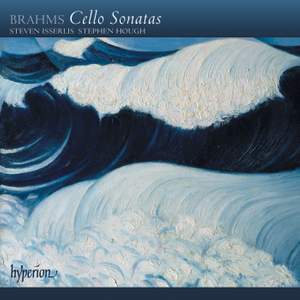Brahms - Cello Sonatas
Steven Isserlis (cello), Stephen Hough (piano)
Isserlis here achieves a beauty, finesse and attack with the cello less evident from his playing 20 years ago: his technique is phenomenal, his bowing at once wildly abandoned and absolutely... — More…
-
BBC Music MagazineDecember 2005Disc of the month
-
Gramophone MagazineJanuary 2006Editor's Choice
CD
$16.25Downloads
What are FLAC and MP3?Contents
Brahms: Cello Sonata No. 1 In E Minor, Op. 38
Work length25:36
$3.30
$4.50
- Steven Isserlis (cello), Stephen Hough (piano)
I. Allegro non troppo
Track length13:50
$1.10
$1.50
II. Allegretto quasi menuetto
Track length5:36
$1.10
$1.50
III. Allegro
Track length6:10
$1.10
$1.50
Dvořák: Waldesruhe (Silent woods) for cello and orchestra, Op. 68 No. 5
Work length5:25
$1.10
$1.50
- Steven Isserlis (cello), Stephen Hough (piano)
Dvořák: Rondo in G minor for cello & piano, Op. 94, B. 171
Work length7:08
$1.10
$1.50
- Steven Isserlis (cello), Stephen Hough (piano)
Suk: Ballade in D minor, Op 3 No 1
Work length5:03
$1.10
$1.50
- Steven Isserlis (cello), Stephen Hough (piano)
Suk: Serenade in A major, Op 3 No 2
Work length4:57
$1.10
$1.50
- Steven Isserlis (cello), Stephen Hough (piano)
Brahms: Cello Sonata No. 2 in F major, Op. 99
Work length25:32
$4.40
$6.00
- Steven Isserlis (cello), Stephen Hough (piano)
I. Allegro vivace
Track length8:03
$1.10
$1.50
II. Adagio affettuoso
Track length6:33
$1.10
$1.50
III. Allegro passionato
Track length6:46
$1.10
$1.50
IV. Allegro molto
Track length4:10
$1.10
$1.50







